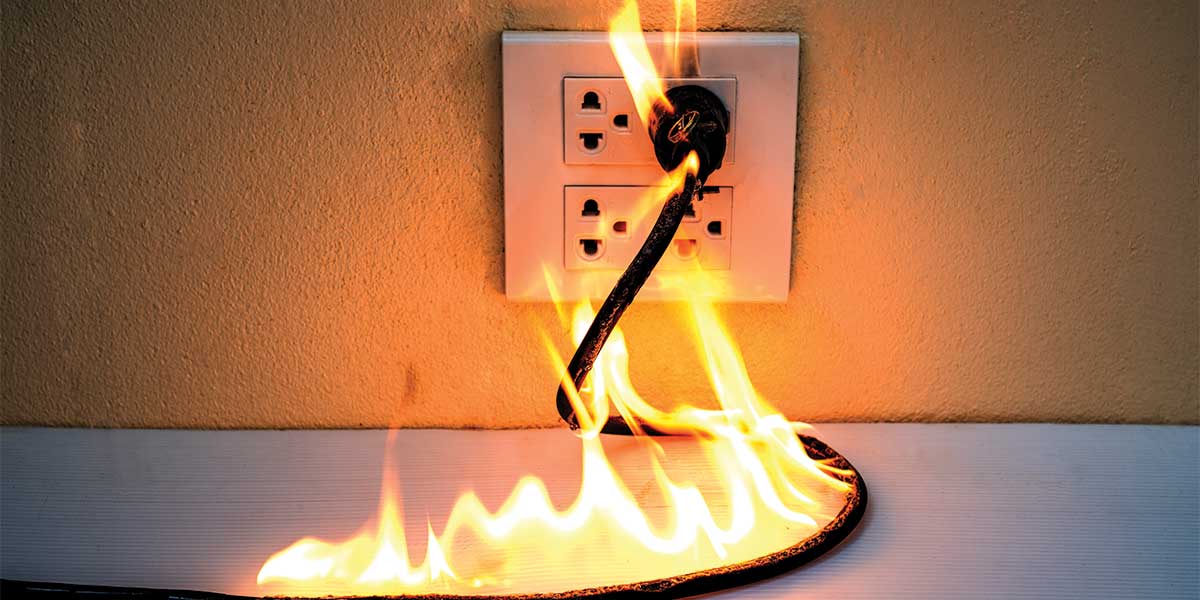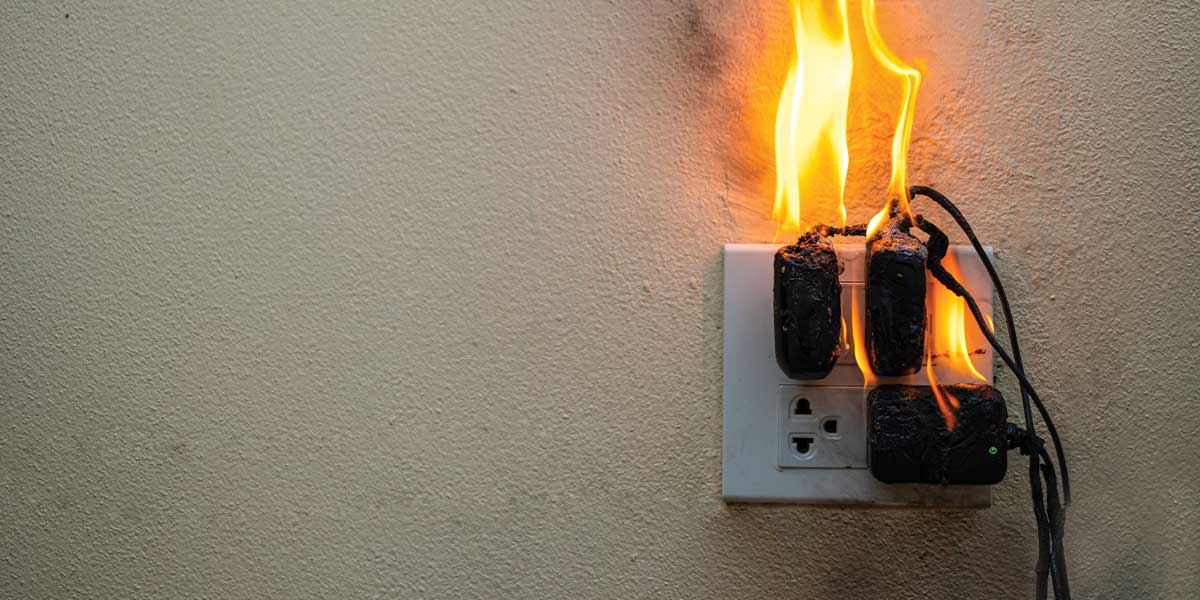Electrical fires are one of the most dangerous and underestimated hazards in homes and businesses. Every year, thousands of fires are caused by faulty wiring, overloaded outlets, or neglected warning signs. Unlike other types of fires, electrical fires can ignite silently, often starting behind walls, in ceilings, or within outlets where they are not easily visible until it’s too late.
Recognizing the warning signs of an electrical fire early is the best way to protect your family, property, and workplace. At Expert Electric, we know how devastating these fires can be, which is why we educate homeowners and business owners on how to spot the risks before they turn into disasters.
In this guide, we’ll break down the most common symptoms of electrical fire hazards, explain why they happen, and provide actionable solutions to keep your electrical system safe.
Why Electrical Fires Happen
An electrical fire usually starts because of heat generated by faulty or overloaded circuits. The most common culprits include:
-
Arcing – When electrical current jumps across a gap or faulty connection, creating sparks.
-
Overloaded circuits – Plugging too many devices into one circuit causes wires to overheat.
-
Damaged or outdated wiring – Older wiring may lack the capacity to handle modern appliances.
-
Faulty appliances – Defective plugs, cords, or internal components can generate dangerous heat.
-
Neglected warning signs – Ignoring flickering lights, buzzing sounds, or tripping breakers allows hazards to escalate.
Understanding these causes is the first step to prevention. The next step is knowing the warning signs of electrical fires.
Common Warning Signs of Electrical Fires
1. Flickering or Dimming Lights
If your lights flicker or dim without explanation, this could indicate a loose connection or overloaded circuit. While sometimes caused by a faulty bulb, frequent flickering may point to wiring issues inside your walls.
Why it matters: Flickering is often a result of arcing, which is one of the leading causes of electrical fires.
What to do:
-
Try replacing the bulb first.
-
If the issue persists, call a licensed electrician immediately.
-
Avoid using DIY fixes, improper handling may make the situation worse.
At Expert Electric, our licensed electricians can quickly troubleshoot these issues and provide long-term, safe solutions.
2. Frequent Breaker Tripping
Circuit breakers are designed to protect your home by shutting off power when there’s a risk of overheating or a short circuit. However, if you notice that your breakers trip multiple times per week, it’s a sign of a deeper electrical issue.
Why it matters: Breakers trip when circuits draw more current than they can safely handle. Repeated trips could mean faulty wiring, short circuits, or dangerous overloads.
What to do:
-
Never ignore a tripping breaker.
-
Contact a professional to inspect your electrical panel and wiring.
-
Consider upgrading your electrical system if it can’t meet your power needs.
3. Burning Odors or Scorch Marks
One of the most obvious signs of an electrical fire hazard is the smell of burning plastic or smoke. This is often caused by overheated outlets, faulty wiring, or failing insulation.
Warning signs include:
-
Outlets that feel hot to the touch.
-
Brown or black scorch marks on outlet covers.
-
A persistent burning smell near outlets or appliances.
What to do:
-
Immediately unplug any connected devices.
-
Do not continue using the outlet until it has been inspected.
4. Buzzing or Crackling Sounds
Electricity should flow silently. If you hear buzzing, crackling, or sizzling noises behind walls, at switches, or from outlets, it could mean loose wiring or arcing.
Why it matters: These sounds often indicate that electricity is escaping its intended path, creating heat and sparks that can ignite fires.
What to do:
-
Stop using the outlet or switch immediately.
-
Call an electrician for a thorough inspection.
-
Never attempt to remove outlet covers or wiring yourself without training.
5. Warm or Discolored Outlets and Switches
If outlets or switches feel warm or worse, hot, when touched, it’s a clear warning sign. Over time, the heat can damage insulation and ignite flammable materials nearby.
What to do:
-
Limit use of the outlet immediately.
-
Have it replaced by a licensed electrician.
-
Use high-quality surge protectors for added safety.
6. Outdated or Aluminum Wiring
Homes built before the 1980s may still contain outdated wiring systems that can’t handle today’s electrical demands. Aluminum wiring, in particular, has a higher risk of overheating and causing electrical fires.
What to do:
-
Schedule an electrical inspection if your home is more than 40 years old.
-
Upgrade wiring as needed to meet modern safety standards.
7. Sparks When Plugging in Appliances
A small, occasional spark can be normal. However, large sparks, sparks accompanied by a burning smell, or sparks that occur frequently are all warning signs of electrical problems.
What to do:
-
Stop using the appliance or outlet immediately.
-
Have a professional identify whether the problem lies in the outlet, wiring, or appliance.

How to Prevent Electrical Fires
Prevention is always better than repair. Here are some proactive measures you can take:
- Schedule regular inspections – Have your system checked every 3–5 years.
- Avoid overloading outlets – Use power strips and surge protectors.
- Replace damaged cords – Never tape or repair frayed cords yourself.
- Upgrade outdated panels – Modern breaker panels offer more protection.
- Install smoke detectors – Especially near kitchens, bedrooms, and electrical panels.
By taking these steps, you significantly reduce the risk of an electrical fire.
FAQs About Electrical Fires
1. How do electrical fires usually start?
Most electrical fires start due to faulty wiring, overloaded outlets, or arcing caused by loose connections.
2. Can I put out an electrical fire with water?
No. Water conducts electricity and can make the fire worse. Use a Class C fire extinguisher instead.
3. Are older homes at higher risk of electrical fires?
Yes. Homes built before modern safety standards often have wiring that cannot handle today’s electrical loads.
4. How often should I schedule an electrical inspection?
It’s recommended to schedule an inspection every 3–5 years, or sooner if you notice warning signs.
5. What should I do if I smell burning plastic from an outlet?
Unplug all devices immediately and call a licensed electrician to inspect and repair the outlet.
Final Thought
Electrical fires can devastate homes and businesses, but they are often preventable. By recognizing the warning signs of electrical fires early and taking proactive steps, you protect not just your property but also the people who matter most.
At Expert Electric, our licensed professionals specialize in identifying and eliminating hazards before they turn into disasters. Whether it’s flickering lights, burning odors, or frequent breaker trips, we provide safe, reliable, and lasting solutions.
Don’t wait until it’s too late. Trust Expert Electric to keep your electrical system safe and your peace of mind intact.
Contact Expert Electric
📞 Call Us: 604-681-8338
📧 Email: info@expertelectric.ca
Take control of your electrical safety today. Contact us for a professional inspection or service appointment and ensure your home or business is fully protected from the dangers of electrical fires.


